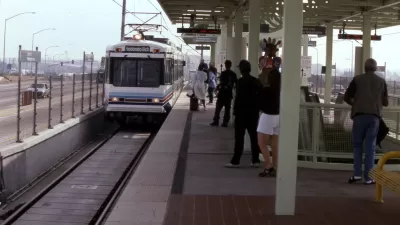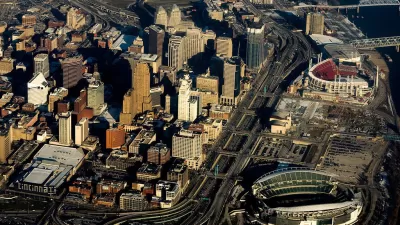Indianapolis is a thriving job market, while Detroit is rapidly decaying and drying up. What's the difference? Policies encouraging public-private partnerships, according to this article from Next American City.
"Many politicians and members of the business community suggest that public-private partnerships - deals in which the government partners with the private sector to deliver a necessary service that it cannot afford, or which it wishes to provide more efficiently - have allowed Indianapolis to prosper. City governments can form PPPs to support small-scale projects, and may also lease the operation of their own assets, but if they want to forge a PPP to back a larger initiative, like a massive infrastructure project, they need legislative support from the state. Indiana law permits the formation of PPPs for infrastructure projects; Michigan law does not."
"The average American city works with private partners to perform 23 of 65 basic municipal services, says Rick Norment, executive director of the National Council on Public Private Partnerships."
"Some states have been slow to adopt PPP legislation because the deal structure can be viewed with suspicion. Unions may misunderstand how such partnerships function, says Norment, while local officials express concern that PPPs take jobs away from the public sector or allow big companies to come in and "squeeze out" local contractors."
FULL STORY: Can PPPs Save Detroit?

Alabama: Trump Terminates Settlements for Black Communities Harmed By Raw Sewage
Trump deemed the landmark civil rights agreement “illegal DEI and environmental justice policy.”

Planetizen Federal Action Tracker
A weekly monitor of how Trump’s orders and actions are impacting planners and planning in America.

The 120 Year Old Tiny Home Villages That Sheltered San Francisco’s Earthquake Refugees
More than a century ago, San Francisco mobilized to house thousands of residents displaced by the 1906 earthquake. Could their strategy offer a model for the present?

Opinion: California’s SB 79 Would Improve Housing Affordability and Transit Access
A proposed bill would legalize transit-oriented development statewide.

Record Temperatures Prompt Push for Environmental Justice Bills
Nevada legislators are proposing laws that would mandate heat mitigation measures to protect residents from the impacts of extreme heat.

Downtown Pittsburgh Set to Gain 1,300 New Housing Units
Pittsburgh’s office buildings, many of which date back to the early 20th century, are prime candidates for conversion to housing.
Urban Design for Planners 1: Software Tools
This six-course series explores essential urban design concepts using open source software and equips planners with the tools they need to participate fully in the urban design process.
Planning for Universal Design
Learn the tools for implementing Universal Design in planning regulations.
Clanton & Associates, Inc.
Jessamine County Fiscal Court
Institute for Housing and Urban Development Studies (IHS)
City of Grandview
Harvard GSD Executive Education
Toledo-Lucas County Plan Commissions
Salt Lake City
NYU Wagner Graduate School of Public Service





























